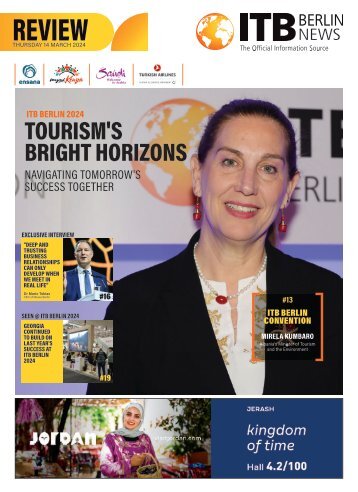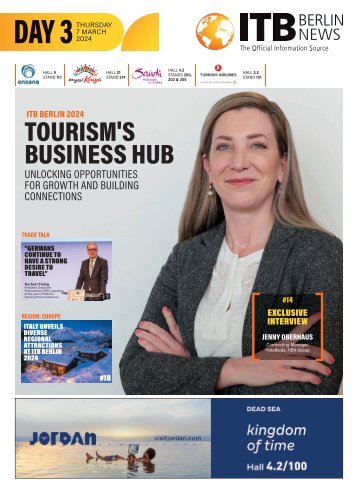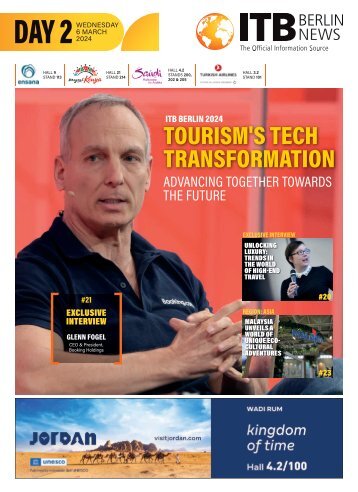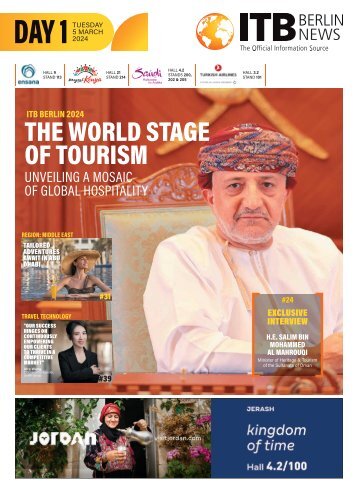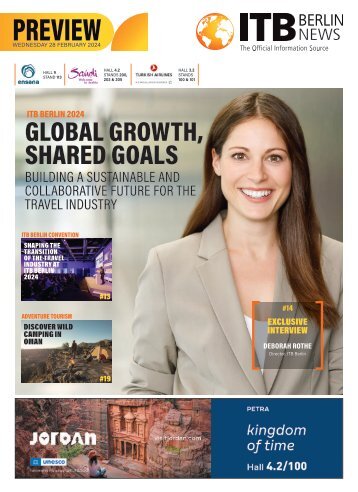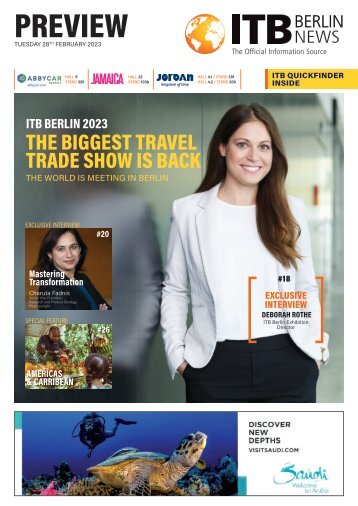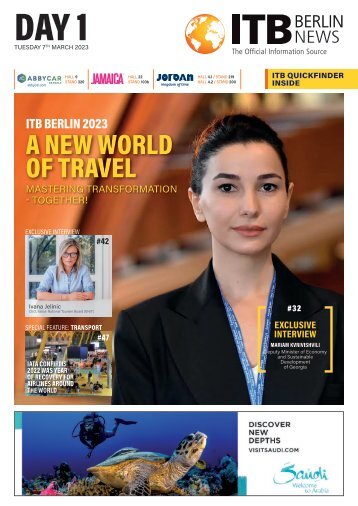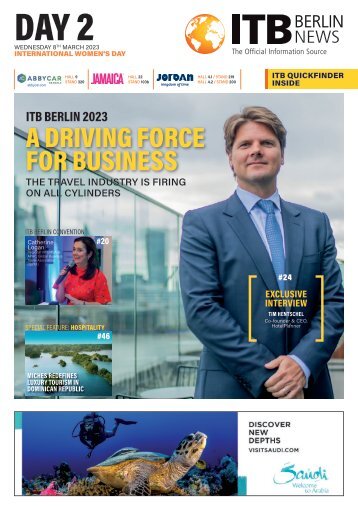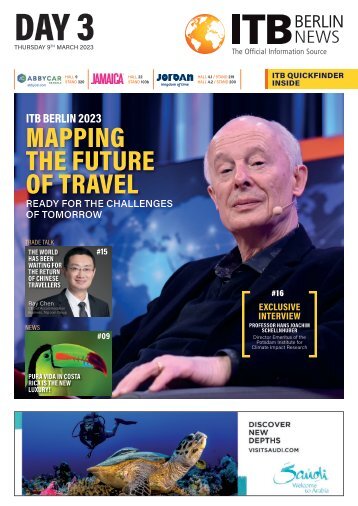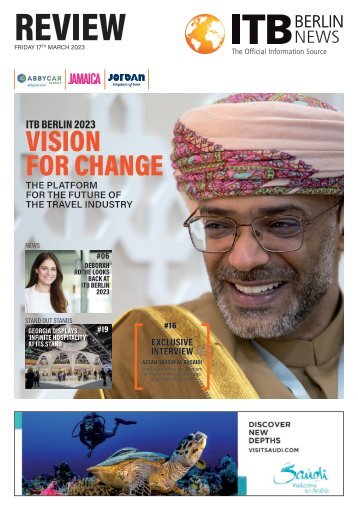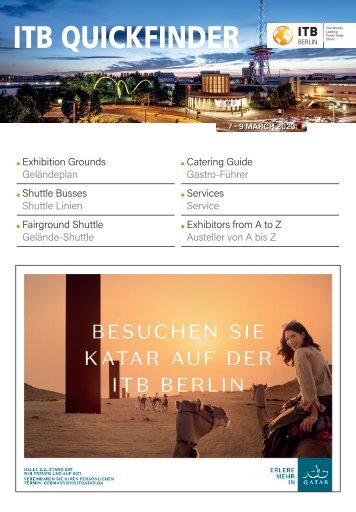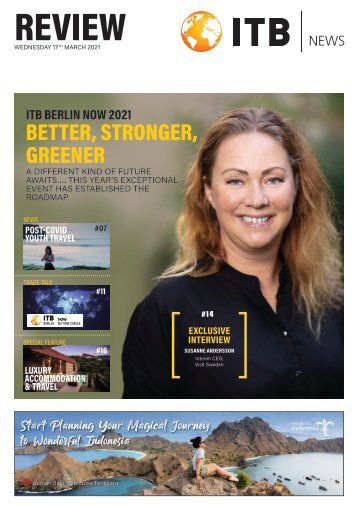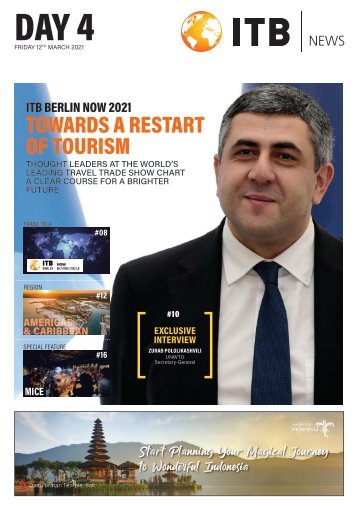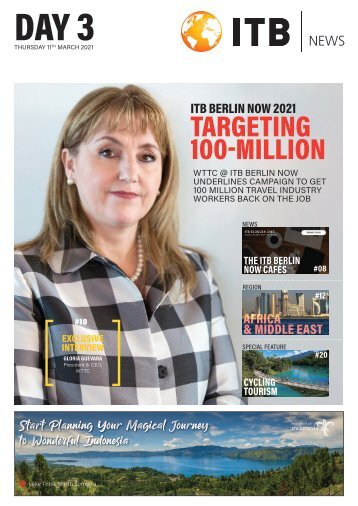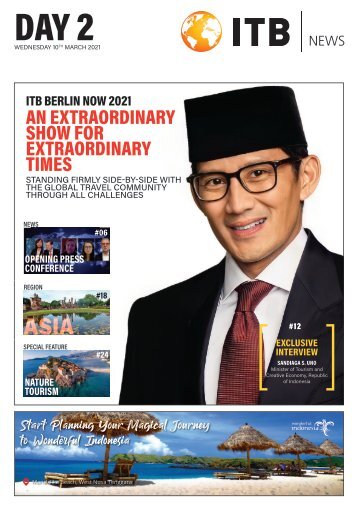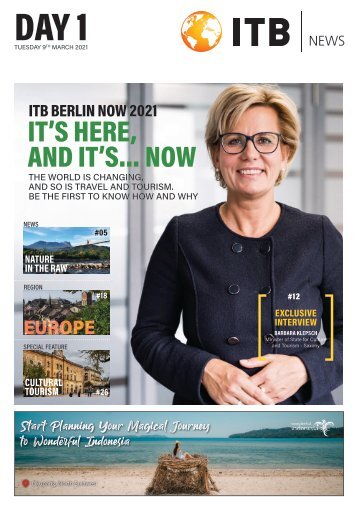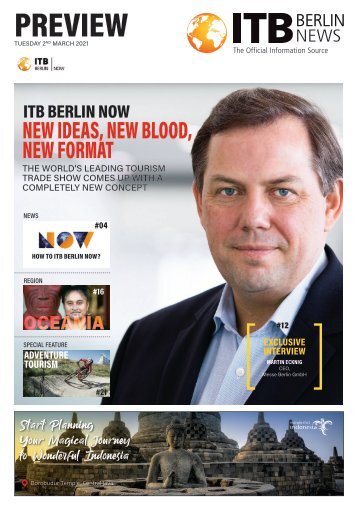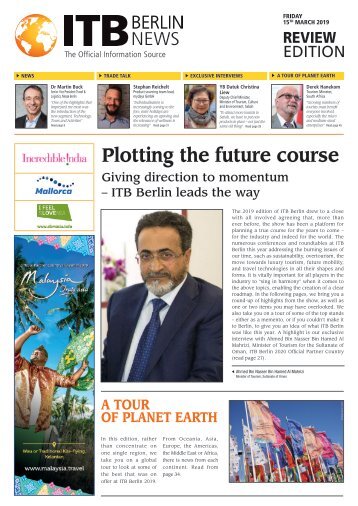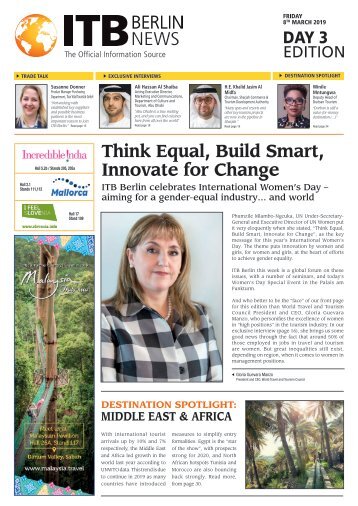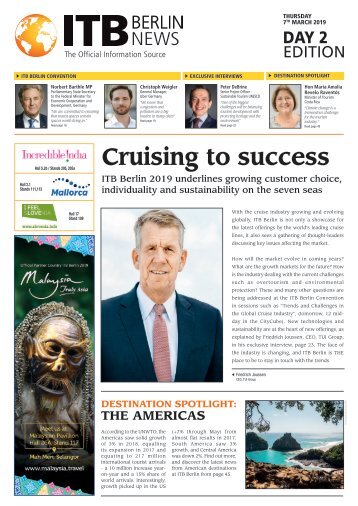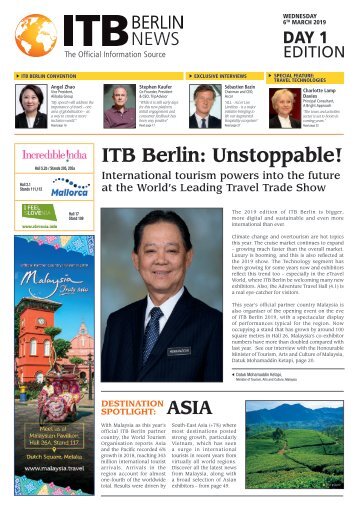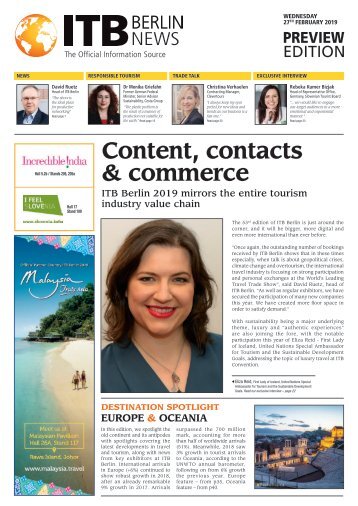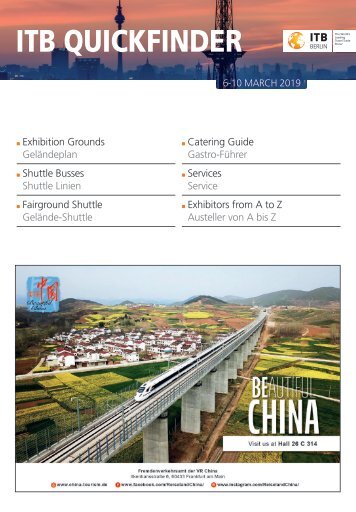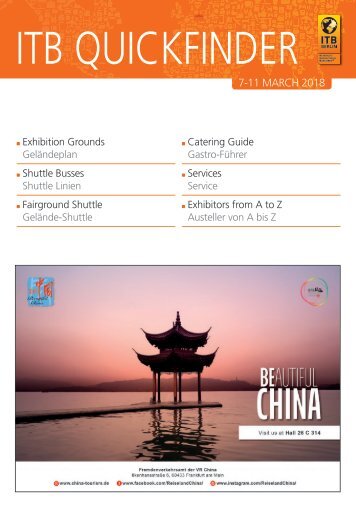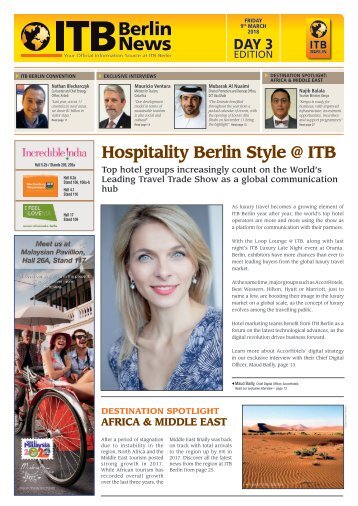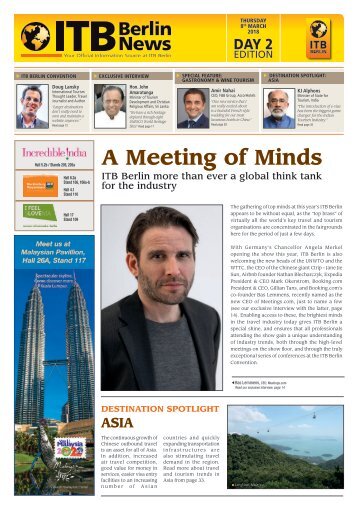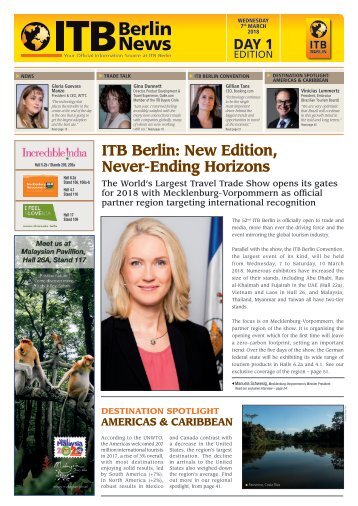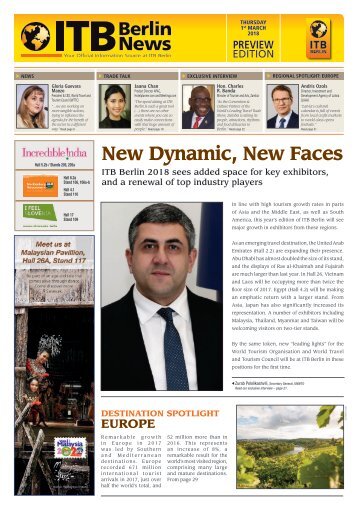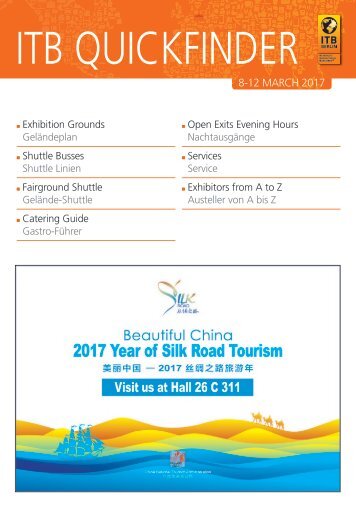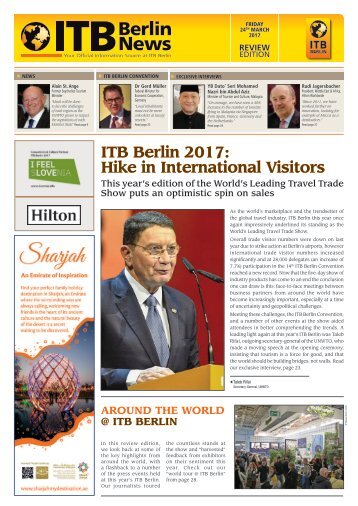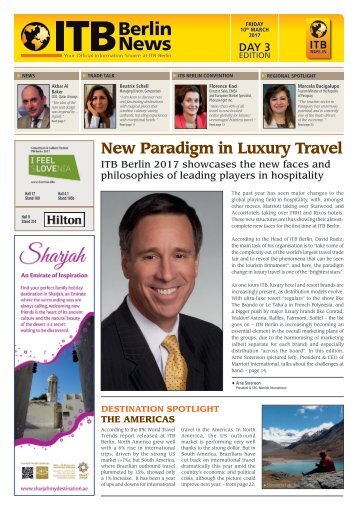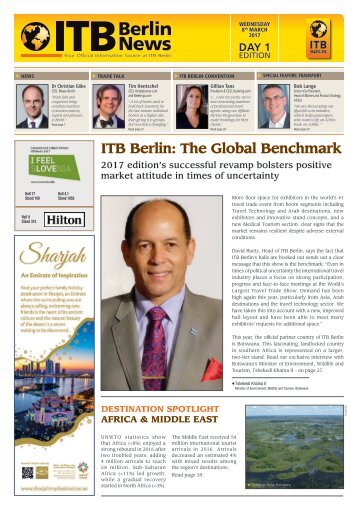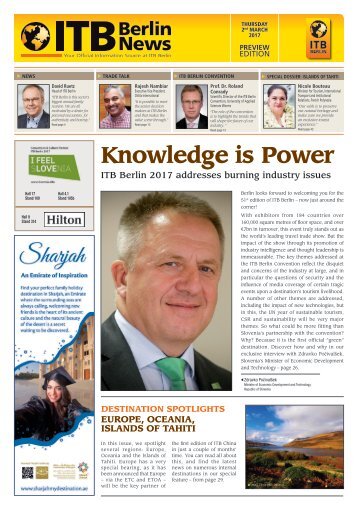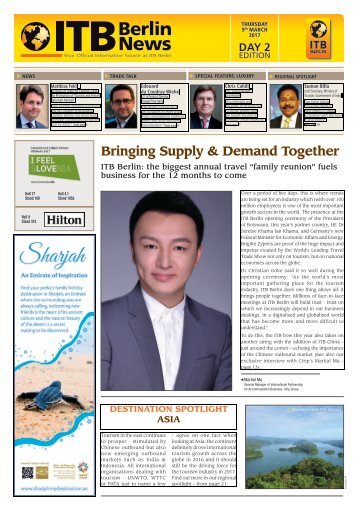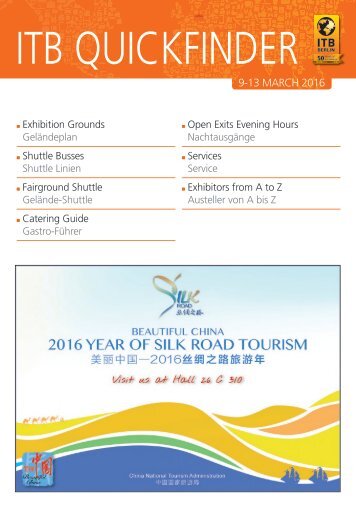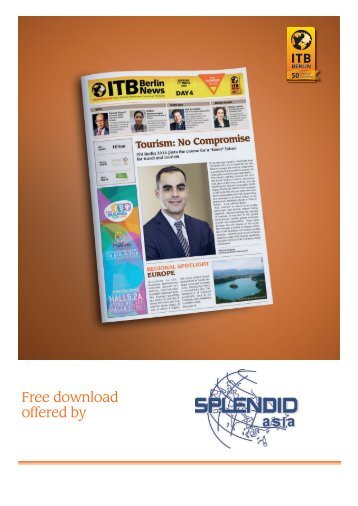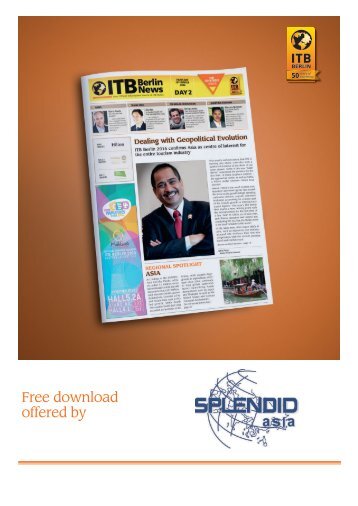
ITB Berlin News Preview Edition
- Text
- Tourism
- Hotels
- Tours
- Berlin
- Resort
- Resorts
- Exhibitors
- Tourismus
- Halle
- Aussteller
- Preview
12 NEWS Understanding
12 NEWS Understanding the Consumer Purchase Journey GfK Hong Kong study finds most travellers use three devices in process of purchasing a flight ticket The latest survey by research organisation GfK on the way people buy travel – undertaken in Hong Kong – shows that nearly all (96%) utilise a combination of the Internet and traditional bricks and mortar channels, with a very low number (2%) using any single channel exclusively. All in all, armed with multiple mobile devices, highly connected consumers in today’s digital era are transforming the travel sector’s landscape into an increasingly professionalized one, especially in a developed market like Hong Kong. 65% of travellers in Hong Kong utilise their PCs, tablets and smartphones during the purchase journey, however, offline travel service providers are still very relevant as travellers exhibit strong omni-channel behaviours, navigating both online and offline platforms throughout the whole process. “Findings revealed that search engines are used intensively at the very beginning of the process for both online and offline purchasers,“ said Van den Oever, Global Travel Director at GfK. “With the widening coverage and global reach of online service providers, consumers are increasingly focusing on specific established brands popular in their local market, reinforcing the fact that having a strong presence and top-of-mind awareness provides these companies with a head start.” This is the first time research has been done utilising the breakthrough methodology of both online and offline tracking of travellers‘ behaviours. The 9-week survey from March to May 2014 polled more than 700 Hong Kong travel decision makers intending to purchase an air ticket in the next 3 months, who agreed to install GfK Nurago’s online tracking software on their digital and mobile devices. This allowed the integration of online tracking data with offline diary and website data to provide in-depth single-source insights into consumers‘ purchase journey in air travel. MASS MEDIA – STILL TRIGGER POINT FOR TRAVEL SEARCHES According to the study, traditional mass media is the most dominant offline touch-point that triggers the gathering of travel information. Three in every four consumers (74%) were prompted to action after they saw an advertisement in a newspaper or magazine, while 70 percent said they read an article in these publications. Meanwhile, over half said their travel plans were sparked by TV or radio ads. “Advertising in the mass media is an effective platform to garner the interest of intended travellers and a good complementary channel that helps them shift from offline to online,” highlighted Van den Oever. “Over 98 percent of respondents said they took their research online and 54 percent eventually completed their purchase during this process.” Another interesting highlight of the study is the fact that a typical consumer spends almost 5 hours researching online for their trip. During this period, they make an average of 92 visits to 22 travel-related websites and Apps before actually purchasing their bookings via the Internet. The most popular online sites used are search engines which were visited by 9 in 10 respondents (91%), followed by travel aggregator and information sites (83%), travel booking sites (79%), airline companies (69%) and social media sites (38%). “It is especially important for industry players to understand the consumer purchase journey as they plan their trips so that travel service providers can more thoroughly understand the complexity of the process,” said Van den Oever. “This will ensure that they are effective in their offerings and present in the relevant phase of the journey, both online and off line, and from the planning stage right to the very end when the purchase is eventually made,” he concluded. …THEY MAKE AN AVERAGE OF 92 VISITS TO 22 TRAVEL- RELATED WEBSITES AND APPS BEFORE ACTUALLY PURCHASING THEIR BOOKINGS VIA THE INTERNET… ITB BERLIN NEWS • Thursday 26 th February 2015 www.itb-berlin-news.com
NEWS 13 The Lansky Effect A smart, funny and inspiring look at where travel is headed… Doug Lansky is described as a Travel Writer, Keynote Speaker & Tourism Development Advisor. If you managed to squeeze into the packed room to see him speak at last year’s ITB Berlin Convention, you know you’re in for a fun, inspiring, and thought-provoking ride that will change the way you look at travel. This year, Doug is participating in three separate events in the ITB Convention. We asked him how important he feels it is to educate and inform the professional visitors to the show… and why… Destination Europe Major Joint- Promotion Initiative Most tourism professionals are busy working to make deadlines or deal with the workload that has been placed upon them. They don’t have the luxury to spend much time looking around this global industry and try to spot unreported trends and fresh ideas. I do. And I’m happy to share what I’ve learned. To be honest, presentations aren’t the most important part of the ITB Berlin for many. But for those who can make a little time to learn about a subject that can give them new insights, it can be enough to get a step ahead of the competition or make themselves a more valuable part of their organization. Your first topic – on day one of the show - is “Destination Shift to Digital”. What exactly do you mean by that? It’s an honour to be part of that panel and it’s hard to know exactly what will come out of the dialog, but there are clearly a lot more digital tools available to the modern destination and stakeholders. The trick is figuring out which ones are worth the time and effort, and how to best use them. Sometimes, we can be seduced by the shiny new toy, so it’s helpful to hear a range of opinions as you navigate this landscape. Also on day one, your outlook topic is about “What the smartest destinations are doing right”. Can you give us a foretaste? We can get just about anywhere in the world within a day’s travel. Or at least a day and half. The price difference between a two-hour trip and 12-hour trip might be just a few hundred Euros. DMAI says there are now over 4000 DMOs worldwide vying for visitors. Which all means there’s more competition than ever. And it’s not a battle of social media: the fastest growing destinations don’t have the biggest social media operation and the destinations with the biggest social media operations don’t necessarily have impressive visitor growth. In many ways, it comes back to what people are travelling to see and experience. In other words, the product. So... what makes your destination unique? How can you best position that uniqueness? And what can you do to create a unique selling proposition if you don’t currently have one? What works for one destination, like Stockholm’s fairly new ABBA museum, isn’t going Doug Lansky Travel Writer, Keynote Speaker & Tourism Development Advisor SOMETIMES, WE CAN BE SEDUCED BY THE SHINY NEW TOY, SO IT’S HELPFUL TO HEAR A RANGE OF OPINIONS AS YOU NAVIGATE THIS LANDSCAPE to work someplace else. That’s what makes it such a strong fit. But if you see the types of things that work, you can perhaps look at your own offerings in a new way and apply the basic way of thinking to come up with something that will be a perfect fit with your destination. That’s why I’ll be putting on a short showcase of my favourite examples. … Can’t give any more away. You’ll just have to come and check it out. The European Commission and European Travel Commission have announced an essential workshop for European tourism professionals during ITB Berlin 2015. Top ranking tourism officials from across Europe will be meeting during ITB Berlin to decide a course of action for the joint publicprivate promotion of Europe as a tourist destination. The workshop (3:00 - 6:30 pm, Wednesday 4th March 2015, Room M1, City Cube Berlin) is aimed at gathering together leading public and private tourism stakeholders to discuss about a possible roadmap (objectives, roles, types of activities and milestones). The discussions on the occasion of the European Tourism Forum and European Tourism Day 2014 will highlight that it is crucial that European tourism organizations at all levels continue to strengthen their collaboration under the umbrella of a common European approach and positioning. A panel of high-level representatives of successful public-private partnerships promoting internationally major tourist destinations will share their experiences and present their achievements, discussing: “What is the best course of action for implementing a dedicated ‘Destination Europe’ Joint Promotion Initiative?” - “Which key public and private players should be involved?” - “What are the advantages for both established and less known destinations?” Key participants will include: • Pedro Ortùn, Director for “Service Industries”, Directorate-General Internal Market, Industry, Entrepreneurship and SMEs (DG GROW), European Commission • Peter de Wilde, President, European Travel Commission (ETC) • Nikolina Angelkova, Minister of Tourism of the Republic of Bulgaria - Ana-Claudia Tapardel, Member of the European Parliament (EP), Chair of the EP Intergroup on European Tourism Development, Cultural Heritage, Ways of Saint James and other European Cultural Routes. Further information: www.etc-corporate.org ITB BERLIN NEWS • Thursday 26 th February 2015
- Page 1: THURSDAY 26 th FEBRUARY 2015 PREVIE
- Page 5 and 6: NEWS 5 More International Than Ever
- Page 7 and 8: NEWS 7 German Tourists Flock Back t
- Page 9 and 10: NEWS 9 United Arab Emirates at ITB
- Page 11: NEWS 11 © China Tours Hamburg Hall
- Page 15 and 16: NEWS 15 When Travel and Tourism Mee
- Page 17 and 18: Hall 2.1 Stand 200 NEWS 17 ADVERTOR
- Page 19 and 20: TRADE TALK 19 The Importance of a R
- Page 21 and 22: ITB BERLIN CONVENTION 21 Reaching T
- Page 23 and 24: ITB BERLIN CONVENTION 23 PROGRAMME
- Page 25 and 26: EXCLUSIVE INTERVIEW 25 lin sm growt
- Page 27 and 28: EDUCATION / TRAINING SPECIAL FEATUR
- Page 29 and 30: Hall 2.1 Stand 200 HONEYMOONS SPECI
- Page 31 and 32: SHOPPING TOURISM SPECIAL FEATURE 31
- Page 33 and 34: ADVENTURE TOURISM SPECIAL FEATURE 3
- Page 35 and 36: YOUTH TRAVEL Millennial Traveller I
- Page 37 and 38: OCEANIA REGION 37 © Tourism New Ze
- Page 39 and 40: OCEANIA REGION 39 The Land Where Ti
- Page 41 and 42: OCEANIA REGION 41 The Lure of Prist
- Page 43: 43 WHERE TO GOIN BERLIN recipe of t
- Page 46 and 47: EXHIBITION GROUNDS GELÄNDEPLAN Hal
- Page 48 and 49: SHUTTLE BUSSES & FAIRGROUND SHUTTLE
- Page 50 and 51: SERVICES SERVICE Airports Informati
- Page 52 and 53: EXHIBITORS FROM A TO Z AUSTELLER VO
- Page 54 and 55: EXHIBITORS FROM A TO Z AUSTELLER VO
- Page 56: EXHIBITORS FROM A TO Z AUSTELLER VO
- Page 59 and 60: D / E / F EXHIBITORS / AUSSTELLER H
- Page 61 and 62: F / G / H EXHIBITORS / AUSSTELLER H
- Page 63 and 64:
H / I / J / K EXHIBITORS / AUSSTELL
- Page 65 and 66:
K / L / M EXHIBITORS / AUSSTELLER H
- Page 67 and 68:
M / N / O EXHIBITORS / AUSSTELLER H
- Page 69 and 70:
O / P / Q / R EXHIBITORS / AUSSTELL
- Page 71 and 72:
R / S EXHIBITORS / AUSSTELLER HALL
- Page 73 and 74:
S / T EXHIBITORS / AUSSTELLER HALL
- Page 75 and 76:
T / U / V EXHIBITORS / AUSSTELLER H
Inappropriate
Loading...
Mail this publication
Loading...
Embed
Loading...
